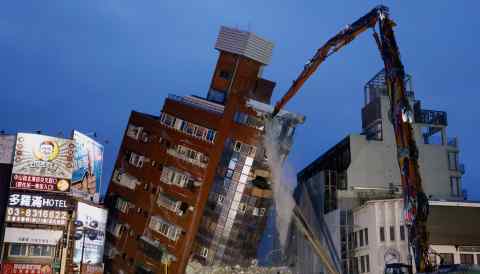
TAIPEI -- A powerful earthquake struck in the ocean near Taiwan on Wednesday morning, killing at least nine people and shaking the island's critical high-tech industries while briefly triggering tsunami alerts in the Philippines and Japan's Okinawa.
The quake registered at magnitude-7.2 off the coast of Hualien, according to Taiwan's central weather administration, which said it was the biggest temblor to hit the island since September 1999. As of Thursday morning, the official death toll stood at nine with 1,038 injured, 93 people trapped and 52 unable to be contacted.
Buildings were severely tilted and train tracks were broken in Hualien, where the local government suspended work and school for the day. Roads leading to the city were also cracked. The people trapped or out of contact included miners, workers at the luxury Silks Place Taroko hotel and tourists at the Jiuqu Cave.
Taiwan's tech companies were assessing the impact. Taiwan Semiconductor Manufacturing Co., the world's top chipmaker, said that all personnel were safe but that the company had evacuated some of its factories as a precaution.
TSMC said in a statement late Wednesday night that inspections had found that "a small number of [chipmaking] tools were damaged at certain facilities, partially impacting those operations." But there was no damage to critical equipment, including all of TSMC's most advanced extreme ultraviolet (EUV) lithography machines that make top-of-the-line processors for artificial intelligence and mobile phones, according to the company.
The chipmaker said more than 70% of its chipmaking tools had recovered within 10 hours of the earthquake, and that the recovery of chip equipment operations at its most advanced factory, Fab 18 in the southern city of Tainan, had recovered 80%.
United Microelectronics' CFO Liu Chi-tung told Nikkei Asia that the world's third-largest contract chipmaker had also evacuated production facilities. "Some chipmaking machines did stop and now our team is working to restart the production machines as soon as possible," he said.
Display makers Innolux and AUO both evacuated facilities.
A manager at a TSMC equipment supplier told Nikkei Asia that his company was discussing whether to dispatch more staff to work overtime during the upcoming tomb-sweeping holidays later this week, to help chipmakers make up for the disruption.
Sources at TSMC said that some wafers were cracked at factories in Hsinchu and that some machinery was halted. Many expected to have to work over the holidays as a result.
But as the day went on, companies including Foxconn, United Microelectronics and Winbond all said there would be no significant effect on finances.
In Tainan, home to some of the most advanced chip fabrication facilities -- including TSMC's 5-nanometer and 3-nanometer factories, which make processors for Apple's iPhones and Nvidia's AI computing chips -- the impact appeared to be limited.
On Taiwan's stock market, the Taiex Weighted Index dropped immediately after the opening bell. It was down by as much as 0.96% during the day and closed down 0.63%.
In Japan, the Meteorological Agency measured a preliminary magnitude of 7.5, later upgraded to 7.7, while officials said they were looking into the difference with Taiwan's reading. They said the quake struck at a depth of 23 kilometers.
Japanese officials originally warned of a tsunami that could reach as high as 3 meters in Okinawa. At 9:18 a.m., a tsunami of up to 30 cm was observed at Japan's Yonaguni Island, near Taiwan. In the Philippines, authorities also issued a tsunami warning for four provinces in the north.
Authorities in both countries later canceled the warnings.
Naha Airport, near the coast on Okinawa's main island, temporarily suspended commercial flights due to the tsunami warning but resumed operations around 11 a.m.
Some Japanese companies with operations in Taiwan reported minor damage, including chipmaking equipment manufacturer Tokyo Electron and Ebara, a supplier of wafer polishing machines. Tokyo Electron has multiple facilities in Hsinchu, Linkou, Taichung and Tainan -- mainly for maintenance and corporate operations -- but said it was not expecting long-lasting effects.
A Japan Meteorological Agency official, meanwhile, warned of further seismic instability. "Be aware of earthquakes of the same magnitude for about a week after the quake. In particular, large earthquakes are likely to occur during the next two to three days." The earthquake was likely caused by dip-slip faults being compressed and shifted up and down, according to the agency.
Japanese Prime Minister Fumio Kishida expressed condolences for the victims in Taiwan. "Japan stands ready to provide any assistance necessary to Taiwan, our neighbor across the sea, in times of difficulty," he wrote on X.
Additional reporting by Sayumi Take, Tamayo Muto and Ryohtaroh Satoh in Tokyo.




.png?width=240&height=137&fit=cover&gravity=faces&dpr=2&quality=medium&source=nar-cms)




